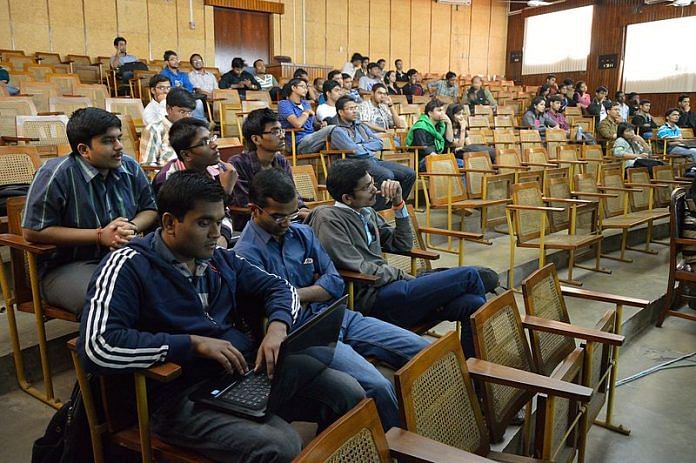As more business is transacted on the basis of our online behaviour and ‘intuitive functionality’, a liberal arts degree is the most sought-after skill in the American tech industry today.
In May 2011, Sir John Makinson, former chairman of the Financial Times Group visited India. One of the places he stopped by was the UIDAI office in Delhi, where he met the team that was putting in place India’s ambitious turbo-charged social security biometric identity system.
But what was interesting was the sharp observation he made after an extended discussion with the team.
“I am a bit worried that Aadhaar is piloted by too many engineers and too few liberal arts majors,” he said to a UIDAI member, Praveen Chakravarty, over dinner that night.
Years later, his insight has come back to bite the Aadhaar architecture, beleaguered as it is over issues of coercion, privacy and perception.
Yes, the top founding team at the UIDAI included all engineers who were charged with the mandate of offering technocratic solutions to India’s governance problems. A sociologist in that team would have foreseen some of the problems the system faces today – mainly one of trust deficit and consent.
The artificial distance in the liberal arts-versus-engineering binary is now slowly collapsing around the world.
A recent report said IIT-Kharagpur would now introduce fine arts — music and dance classes — for its engineering students. The central goal appears to be what is popularly called ‘holistic’ development.
Niti Ayog’s Amitabh Kant tweeted Saturday: “Delighted that IITs are redesigning their courses to include credits on arts & humanities including appreciation of creative arts. This would lead all round holistic development of our engineers & boost innovation & research in classical music, art forms & architecture.”
Delighted that IITs are redesigning their courses to include credits on arts & humanities including appreciation of creative arts. This would lead all round holistic development of our engineers & boost innovation & research in classical music, art forms & architecture.
— Amitabh Kant (@amitabhk87) May 19, 2018
In recent years, IIT-Hyderabad has offered short creative arts courses as well. Of course, all this is a really belated realisation that an exclusive engineering degree may just turn out to be too hollow. For too many decades, we have been fixated on engineering degrees as a marker of social success.
Over the last couple of years, it appeared to deepen in India as assaults on liberal arts colleges rose in public discourse. We have heard people say: “Yeh duniya technology se chalti hai, sociology se nahin (the world runs on technology not sociology)”.
Our lingering fascination with the haloed IIT engineers as the solution for all of India’s ills is baffling — even as a grand shift is already underway in the United States.
As we are engulfed by an era of what the Harvard scholar Shoshana Zuboff calls “surveillance capitalism” — especially after the jaw-dropping revelations about the Cambridge Analytica — Makinson’s words ring more true today.
In the data economy, as more and more businesses and politics are transacted on the basis of our online behaviour and ‘intuitive functionality’, a liberal arts degree is the most sought-after skill in the American tech industry today. As companies rush to hire coders, a new report in January by the Harvard Business Review anticipated that many of their skills — like programming and data crunching — would get replaced and automated in the not-too-distant a future.
“What can’t be replaced in any organisation imaginable in the future is precisely what seems overlooked today: liberal arts skills, such as creativity, empathy, listening, and vision. These skills, not digital or technological ones, will hold the keys to a company’s future success. And yet companies aren’t hiring for them,” said the report. “Soon, companies will rush to hire these skills in the same way that they compete for coders and engineers today.”
Welcome change
As the harvested data gets more and more sophisticated — moving from standard stock information like age, sex, income to unstructured, real-time behaviour, preferences and observations — coding will give way to liberal arts skills like analysis, critical thinking and behavioural anthropology.
To prosper in the digital economy, Indians must be ready to shed their inflexible STEM-only mindset. We can’t lag behind the curve when it comes to foreseeing and preparing for this change.
The news about the IITs embracing creative arts is welcome change. They should also add humanities to it. But the courses shouldn’t just be pegged as ‘soft’ skills, and must be integrated into the engineering curriculum.
There is nothing ‘soft’ about first-rate social science, says Tridip Suhrud, who taught Gandhian studies at a design and engineering college some years ago. “There was a mental block from those who thought that such a course may not have any applications,” he said. “One had to show that humanities and social science were not a mode of doing but a mode of thinking about self and the world.”
Doing and thinking are conjoined twins in the internet economy, as user experiences and digital anthropology are the centre-pieces of how we shape the new era.




Overhyped socialisation of engineering and technology.